Filter by
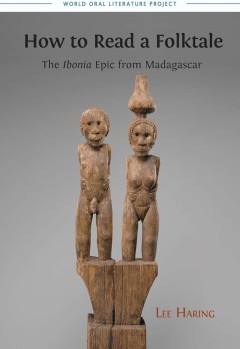
How to Read a Folktale : The ‘Ibonia’ Epic From Madagascar
How to Read a Folktale offers the first English translation of Ibonia, a spellbinding tale of old Madagascar. Ibonia is a folktale on epic scale. Much of its plot sounds familiar: a powerful royal hero attempts to rescue his betrothed from an evil adversary and, after a series of tests and duels, he and his lover are joyfully united with a marriage that affirms the royal lineage. These fairytal…
- Edition
- -
- ISBN/ISSN
- 9781909254077
- Collation
- 163 halaman
- Series Title
- -
- Call Number
- 800 HAR h
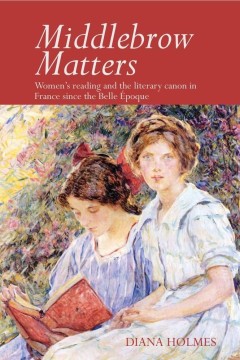
Middlebrow Matters : Women's reading and the literary canon in France since t…
Middlebrow is a derogatory word that connotes blandness, mediocrity and a failed aspiration to ‘high' culture. However, when appropriated as a positive term to denote that wide swathe of literature between the challenging experimentalism of the high and the formulaic drive of the popular, it enables a rethinking of the literary canon from the point of view of what most readers actually re…
- Edition
- -
- ISBN/ISSN
- 9781786941565
- Collation
- -
- Series Title
- Contemporary French and Francophone Cultures
- Call Number
- 800 HOL m
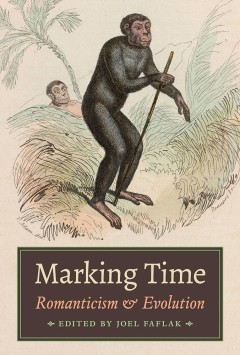
Marking Time : Romanticism and Evolution
Scholars have long studied the impact of Charles Darwin's writings on nineteenth-century culture. However, few have ventured to examine the precursors to the ideas of Darwin and others in the Romantic period. Marking Time, edited by Joel Faflak, analyses prevailing notions of evolution by tracing its origins to the literary, scientific, and philosophical discourses of the long nineteenth centur…
- Edition
- -
- ISBN/ISSN
- 9781442644304
- Collation
- 336 halaman
- Series Title
- -
- Call Number
- 800 MAR
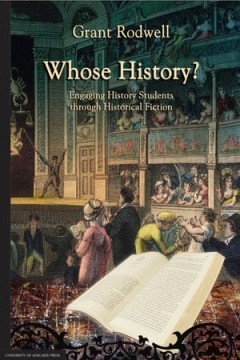
Whose History? : Engaging History Students through Historical Fiction
Whose History? aims to illustrate how historical novels and their related genres may be used as an engaging teacher/learning strategy for student teachers in pre-service teacher education courses. It does not argue all teaching of History curriculum in pre-service units should be based on the use of historical novels as a stimulus, nor does it argue for a particular percentage of the use of his…
- Edition
- -
- ISBN/ISSN
- 9781922064509
- Collation
- 280 halaman
- Series Title
- -
- Call Number
- 800 ROD w
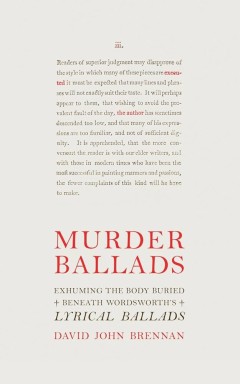
Murder Ballads : Exhuming The Body Buried Beneath Wordsworth's Lyrical Ballads
In 1798, William Wordsworth and Samuel Taylor Coleridge were engaged in a top secret experiment. This was not, as many assume, the creation of a book of poetry. A book emerged, to be sure—the landmark Lyrical Ballads. But in Murder Ballads, David John Brennan posits that the two poets were in fact pursuing far different ends: to birth from their poems a singular, idealized Poet. Despite their…
- Edition
- -
- ISBN/ISSN
- 9780692734629
- Collation
- 160 halaman
- Series Title
- -
- Call Number
- 800 BRE m
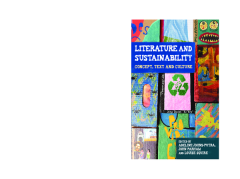
Literature and Sustainability : Exploratory Essays
Sustainability has become a key socio-political issue over recent years. However, whilst the literary-critical community has advanced enthusiastically on an exciting range of environmentally-based analyses (most obviously through the work of ecocriticism), its response specifically to sustainability—as an attempt to reconceptualise the way we live, as an idea with a particular history, a…
- Edition
- -
- ISBN/ISSN
- 9780719099670
- Collation
- -
- Series Title
- -
- Call Number
- 800 JOH l
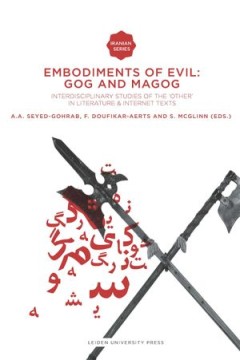
Embodiments of Evil : Gog and Magog : interdisciplinary Studies of The "Other…
Gog and Magog, as archetypes of evil, have dwelt in our consciousness since their threatening appearance in the Bible and Quran. Maps, literature and texts ranging from Medieval Europe, the Byzantine and Arab world, in Berber, Persian and Indonesian traditions, to contemporary internet texts: all use these imaginary monstrous creatures. The figures are constantly reinterpreted as the enemies of…
- Edition
- -
- ISBN/ISSN
- 9789087280901
- Collation
- -
- Series Title
- -
- Call Number
- 800 SEY e
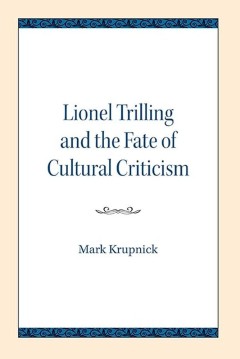
Lionel Trilling and the Fate of Cultural Criticism
Lionel Trilling was one of the twentieth century’s most widely read and influential American literary critics. Mark Krupnick traces Trilling’s career from the 1920s through the 1970s, following the shifting intellectual and ideological currents in his thought. Krupnick places Trilling’s criticism and fiction in the context of his New York intellectual group, illuminating the connection be…
- Edition
- -
- ISBN/ISSN
- 9780810139442
- Collation
- 216 halaman
- Series Title
- -
- Call Number
- 800 KRU l
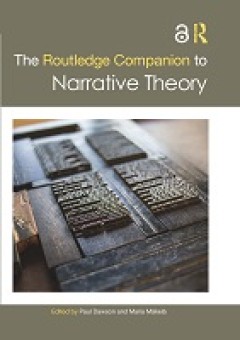
Chapter 35 Migration and Narrative Dynamics
How can narrative theory account for the changing roles of storytelling and storysharing in the public sphere? This essay proposes a new concept of narrative dynamics, one that generates well-constrained descriptions of specific elements, features, or qualities of narratives, as well as programmatic claims concerning their potential uses and effects. Narrative dynamics research is equally inter…
- Edition
- -
- ISBN/ISSN
- 9780367569730
- Collation
- Pages 15
- Series Title
- -
- Call Number
- 900 ROY c
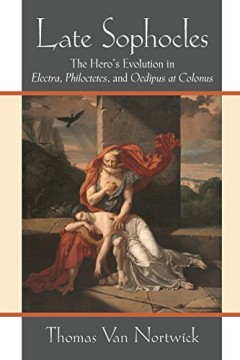
Late Sophocles : The Hero's Evolution in Electra, Philoctetes, and Oedipus at…
Only a few plays by Sophocles—one of the great tragic playwrights from Classical Athens—have survived, and each of them dramatizes events from the rich store of myths that framed literature and art. Sophocles' treatment evokes issues that were vividly contemporary for Athenian audiences of the Periclean age: How could the Athenians incorporate older, aristocratic ideas about human…
- Edition
- -
- ISBN/ISSN
- 9780472119561
- Collation
- 160 halaman
- Series Title
- -
- Call Number
- 800 VAN l
 Computer Science, Information & General Works
Computer Science, Information & General Works  Philosophy & Psychology
Philosophy & Psychology  Religion
Religion  Social Sciences
Social Sciences  Language
Language  Pure Science
Pure Science  Applied Sciences
Applied Sciences  Art & Recreation
Art & Recreation  Literature
Literature  History & Geography
History & Geography